How To Keep A Kiddie Pool Clean
To beat the summer heat, you bought a kiddie pool and instantly became your kids' favorite parent. After days and days of consecutive use, the pool is starting to get a little dirty. How do you clean a kiddie pool and keep it that way?
Here's a summary of the best tips from real dads on how to keep a kiddie pool clean:
- Skim the pool to remove debris
- Use a small pool vacuum
- Get a pool filter
- Sanitize with chlorine
- Cover the pool when not in use
In this extensive guide I'll show you how to tidy up a kiddie pool with best practices and advice from dads like you! You won't want to miss it.
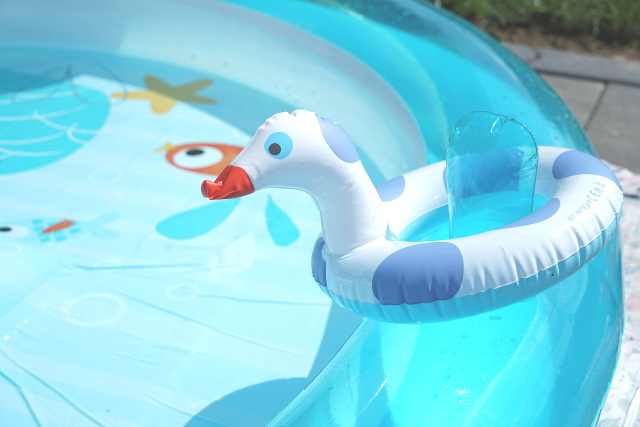
5 Methods for Keeping a Kiddie Pool Clean All Summer Long
1. Skim the Pool to Remove Debris
If you treat a kiddie pool like a miniature version of an in-ground or above-ground pool, its care is easy to master. Unlike a full-sized pool though, keeping the pool tidy doesn't take nearly as long because the kiddie pool doesn't encompass as much surface area.
If you have a pool skimmer from your days of owning a larger pool, it will come in handy for removing surface debris. You know the usual culprits, like leaves, grass, clumps of dirt, maybe a dead bug or two (or maybe some live ones). Debris like this starts decomposing if left and this is a major factor in turning water in your pool bad.
On the days when the kids are swimming, keeping the pool pristine is especially important. The cleanliness of the pool is for the kids' health, plus, you won't have to worry about your son or daughter freaking out over a live ladybug in the pool.
We'd suggest skimming before the kids swim and then again afterward. If you cover your pool between uses, you won't have to skim daily (more on pool covers later). Should you leave the kiddie pool open all summer, skimming will have to become a regular part of your routine. At least it'll be quick!
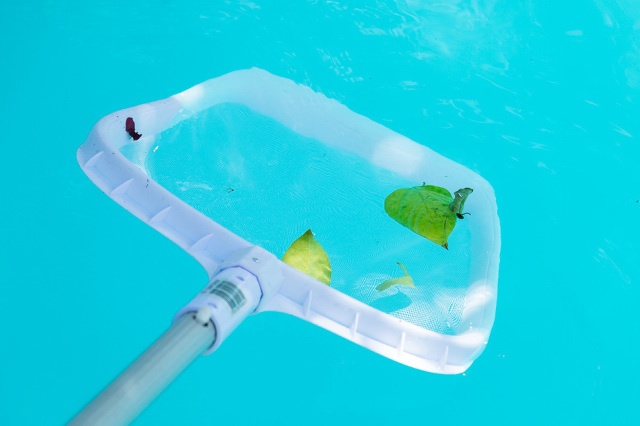
2. Use a Small Pool Portable Vacuum
If you've ever had an inground pool or full size above ground pool you'll know that a pool vacuum or pool cleaner is invaluable for cleaning. The problem is these products connect to the pool's filter system and need a powerful pump to work, making them unsuited to kiddie pools.
There is an alternative and easy way to clean your blowup pool. And that's portable pool vacuums like these:
POOL BLASTER Catfish Ultra
POOLWHALE Portable Pool Vacuum
These pool vacuum cleaners do not require a pool pump or filter system to work. Just like vacuuming your home, these will suck up sediment, dirt, and debris.
POOL BLASTER Catfish Ultra
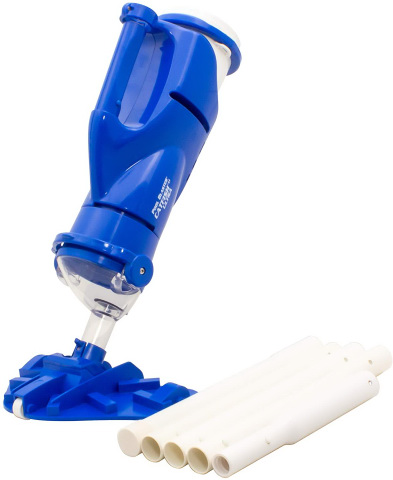
This portable pool cleaner is ideal for kiddie pools and also Intex above ground pools. It doesn't require the pool to have a filter system and requires no other hoses. Simply charge it up, connect it to a pool pole and you're away and cleaning.
The pool vacuum has a fine mesh net to collect even the smallest of debris and will make light work of keeping your portable pool clean. The Lithium Ion battery will keep going for around 45 minutes. When you're finished vacuuming, empty the bag out and put the unit on charge again ready for next time.
Pros:
- Powerful suction (enough to pull up pennies from the bottom)
- Picks up sediment, dirt, leaves etc.
- Requires no hoses or cords
- Portable & lightweight
Cons:
- More expensive option
- Doesn't pick up large leaves (small and medium are OK)
Click here to check price >>
POOLWHALE Portable Pool Vacuum
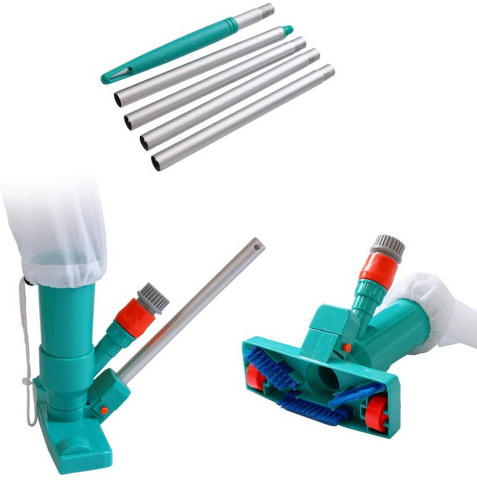
The Poolwhale portable pool vac is a top selling vacuum. Perfect for spas, kiddie pools and pools like Intex and Summer Ways. It comes ready to use with a 48" pole. All you need to do is connect the vac up to a garden hose. The unit uses the pressure from the hose to create suction. No other power source is needed.
Like the Pool Blaster Catfish Ultra, this unit also uses a mesh bag to collect debris.
Many people rave about the effectiveness of this unit and the extremely good value for money.
Pros:
- Low cost (under $50)
- Lightweight and portable
- No power source needed
Cons:
- Need to plug it into a garden hose
- Small filter bag (likely not a problem with a small kiddie pool)
Click here to check price >>
3. Get a Pool Filter
Inflatable pools don't come with filters, but for the cleanliness of your blowup kiddie pool, we'd say buying one is worth it. Like with everything else for kiddie pool maintenance so far, you only need a small filter.
The filter will come with a hose that's several feet long. You can lay the hose over the pool, keeping it in place with sandbags.
While it's running, the filter will pull water and redirect it, sucking up debris and dirt in the process. For safety's sake, if you have to use the pool filter, make sure your kids have had their fill of the pool for the day. Operating the filter with people in the pool can create tripping hazards due to the long hose.
4. Sanitize with Chlorine
An inflatable kiddie pool still needs chlorination. Keeping the pool water balanced in an above-ground pool might have given you headaches, but this won't be nearly as difficult.
All you need is a floating chlorinator and some chlorine tablets. Insert the tablets into the floating chlorinator and put the chlorinator in the water. Then walk away and work on unpacking the groceries or tidying up the garage.
If you use three-inch chlorine tablets, it will take about two weeks for each tablet to dissolve in full. Talk about set it and forget it!
Floating Chlorine Dispenser for Kiddie Pool
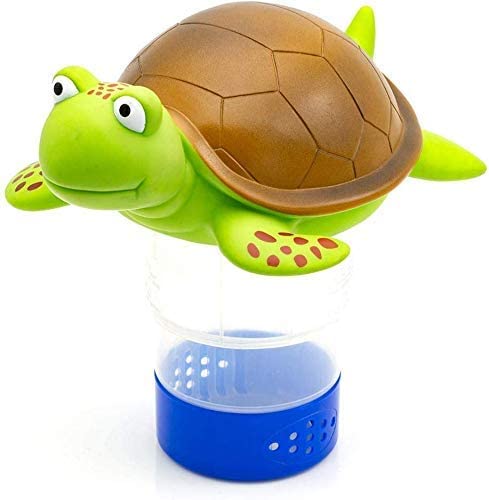
Stabilized Chlorine Tablets for Kiddie Pool
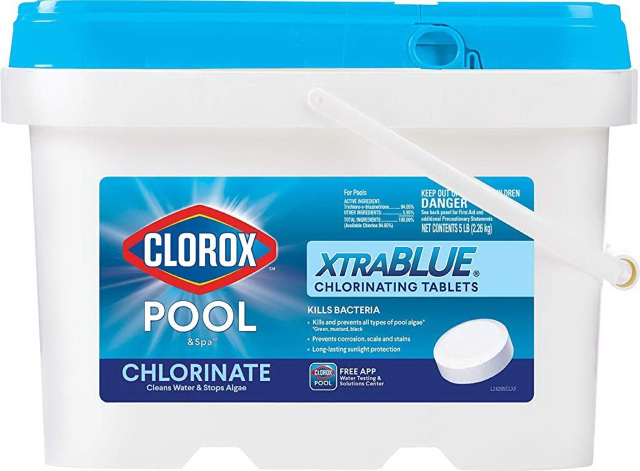
Now, we do have to mention that you need a pool water testing kit in conjunction with chlorinating the pool. Your kit should be made for homeowners so it's easy to understand even if you're not a chemistry major. Here's 3 Popular Ways to Test Your Swimming Pool Water.
Try this Pool Water Test Kit .
Test for the free chlorine in your pool. If the chlorine is between 2.0 and 3.0 particles per million or ppm, then your floating chlorinator is doing a great job. If the chlorine levels are under that, then increase the number of chlorine tablets you use. And if the chlorine level is high, take out the chlorine tablets for a while.
Pro tip: use stabilized chlorine tablets.
If you use non-stabilized tablets, the sun's UV rays will degrade the chlorine within hours making it next to useless.
5. Cover the Pool When Not in Use
We saved our best tip for kiddie pool maintenance for last. Put a cover on the pool when the kids aren't in it.
Yes, it's that easy! You know how valuable a pool cover can be if you've owned an above-ground or in-ground pool before. The cover will keep out dirt and debris.
All solar pool covers can be easily cut to size using scissors.
The added advantage of using a pool cover is it will also warm the water by a few degrees and almost completely eliminate evaporation. To take maximum advantage of this, keep the pool cover on when not in use, and particularly at night.
If you don't want to spend the extra money, then you can take that tarp you've had sitting in the backyard shed and finally put it to use as a makeshift pool cover.
The key to a pool cover being effective is creating a seal around the pool that's as tight as possible. You can secure the corners of the cover with bricks. Bungees work well too.
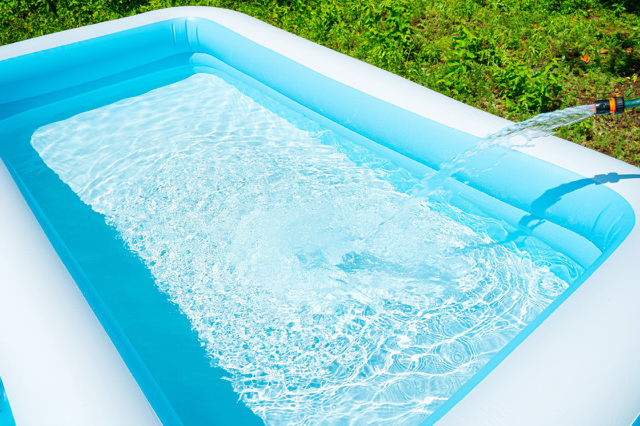
Kiddie Pool Cleaning FAQs
Do you still have more questions about keeping the kiddie pool clean for the rest of summer vacation? No problem, as we've got answers. Check them out!
Do Kiddie Pools Need a Filter to Keep Them Clean?
You've searched high and low for a pool filter meant for inflatable kiddie pools rather than in-ground pools and you've come up empty-handed. Do you really need a filter to keep a small pool like a kiddie pool clean?
Filters certainly help, but we wouldn't say you must have a filter to keep your kiddie pool nice and clean. You will have to skim more often without a filter and will need to use a pool vacuum too.
Do Kiddie Pools Need Chemicals to Keep Them Clean?
Kiddie pools don't need chemicals. If you choose not to use chemicals you will have to drain the pool more often. The point of using chlorine is to remove bacteria such as E. coli and salmonella.
Although we associate both bacteria in uncooked food, if someone makes a bowel movement and doesn't wash their hands, they could get E. coli. If they touch someone or something else, the bacteria can spread. It's the same with salmonella.
Since these are kids that we're talking about, their sanitary habits might not be the best. Your kids are of the age where you don't supervise them in the bathroom anymore, so you're not really sure what they're doing in there.
You could set up a rule where the kids have to wash their hands before swimming if you're not going to use chlorine and other chemicals in the pool. We'd still recommend draining the kiddie pool after every use. When it comes to bacteria, you can never be too careful!
Is It Safe to Put Bleach in a Kiddie Pool?
For sanitizing pools, it is safe to use bleach or Clorox. When bleach mixes with water, it becomes a hypochlorite ion with a negative charge. This is actually chlorine, the same thing pool stores sell.
The bleach will remove microbes in the water so your pool is cleaner. Microbes are a type of bacteria, so bleach serves the same purpose as chlorine. A disadvantage of using bleach is it is not stabilized and any sanitizing power will only last a few hours. Fix that by adding some Cyanuric Acid, aka pool stabilizer or sunscreen for your pool.
Most kiddie pools are inflatable. You worry about the harsh chemicals in bleach eating right through the rubber or plastic.
According to Clorox, a manufacturer of bleach products, you can use bleach in a child's wading pool. A little goes a long, long way. For every 100 gallons of water, add 1/8th a cup of bleach. Clorox says this should be new water, not what's already in the pool.
How to Get Rid of Algae in a Kiddie Pool
Your kiddie pool is not supposed to be green! When you inspect it further, you notice a thin layer of algae has developed on the surface of the water. What is that all about
Algae likes sunlight and warmth, so if your pool has both, you could unwillingly foster its development. Sometimes algae don't grow on your pool, per se, but arrive there via rain and wind.
If you don't clean your pool supplies or wash the kids' swimsuits between uses, in some instances, algae these sources are the culprit for starting an algae bloom.
How do you get rid of algae in your kiddie pool? Using a pool filter, especially if you haven't before, is a start but it won't get rid of it along. You'll also need to apply a shock treatment.
To shock a pool doesn't mean to surprise it, of course. Instead, shocking the pool raises its levels of free chlorine to kill bacteria like algae. It's essentially a super dose of chlorine.
How Often Should You Change Kiddie Pool Water?
We mentioned before how without a pool filter, the risk of E. coli and other bacteria invading the pool increases. If you have to dump your kids' pool water, how often should you do it?
Ideally, you want to replace the water in the pool daily. Yet if your kids are in the pool at least that often, then dumping and refilling the pool repeatedly can feel like a waste of time and water.
If you clean the pool regularly, use chlorine and other chemicals, you may not need to change the water at all. Yes, that's even if your kids are using the pool every day.
Although it can take some time to figure out the right quantity of chemicals and how and when to use them, the time savings you'll earn back are worth it. It's also nice to conserve water, not to mention some states mandate it!
What to Do If a Child Poops in the Kiddie Pool?
Listen, accidents happen, especially if you have young kids. If one of your children poops in the kiddie pool, how do you handle it?
First, get the kids out of the pool, which shouldn't be difficult considering the fecal content in the water.
Next, put on a pair of rubber gloves and try to fish out the poop by hand. Yes, this is gross, but hey, sometimes it's all part of being a dad. Transfer the poop to a plastic bag, tie it off, and throw it in the trash (or the toilet, although not the plastic bag!).
After that, empty the pool. Disinfect the whole kiddie pool with bleach, combining a gallon of water (room temperature) with half a cup of bleach. The Centers for Disease Control and Prevention or CDC recommends using household bleach that contains 5.25 percent to 8.25 percent bleach.
Rinse away the bleach residue with your garden hose and then let the pool dry. Ditch the gloves, wash your hands, and do something nice to treat yourself after that ordeal!
Conclusion
Maintaining the cleanliness of a kiddie pool this summer doesn't have to be a pain. You can use small pool vacuums and floating chlorinators to do most of the hard work while your kids think you're the dad of the year for getting them a pool!
How To Keep A Kiddie Pool Clean
Source: https://www.myperfectpool.com.au/keeping-kiddie-pools-clean.html
Posted by: whitealhas1975.blogspot.com

0 Response to "How To Keep A Kiddie Pool Clean"
Post a Comment